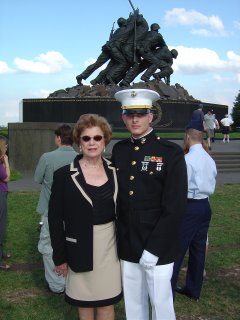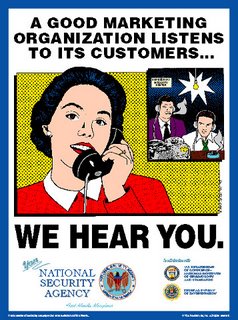THIS ONE’S FOR MOM
 Mom with grandson Ben at Marine Corps War Memorial commissioning ceremony, July of 2004
Mom with grandson Ben at Marine Corps War Memorial commissioning ceremony, July of 2004My mother, Janette Sapiro Finkelstein, asked me to write this column. Mom wanted me to let her friends and acquaintances know that she moved to Connecticut last week. She told me that they read my stuff faithfully. Unfortunately, the cause of the move was a decrease in her faculties and ability to deal with day to day life. Fortunately for her, she has family who care about her- most especially my sister, Sue, who coordinated her move to an assisted living facility a few miles from my sister’s home in Darien, Connecticut.
Mom’s stay in Albany was 13 years. She moved here the year after my son had his Bar Mitzvah, into the apartment vacated by my fiancé, Dawn, after Dawn and I moved in together shortly before our wedding. My mother quickly had an impact, making an astonishing array of friends and acquaintances at the Mall, the YMCA, Phoebe Northwest, and Darton, just to name a few. To the many of her friends who regularly ask me how my mom is doing, the answer is not very well at the moment, but hopefully she’s on the mend.
My mother was born in a leap year on February 29th, 1928, in Venice California. That year her family numbered six- including her mother Lillian Bockser (born in Russia), and father Barnett Sapiro (from London’s East End), both of whom emigrated to the United States in the early 1900’s. In the late 1930’s Mom, her parents, her two older brothers Norman and Louis, and her sister, Phyllis, moved to Hawaii. She was alive and sentient when Franklin Delano Roosevelt was elected President in 1932, when Adolph Hitler became Chancellor of Germany in 1933, and when the Jews were officially declared less than human in Nazi Germany in the 1930’s, then exterminated in the 1940’s. My grandparents were active in founding the Jewish congregation in Hawaii, years before it officially became the 50th state, and Mom has always been proud of that fact.
When the Japanese dive bombers came early on Sunday morning, December 7, 1941, she and her family were there, near the flight path of the bombers as they struck the ships in the harbor and the American planes on Hickam Field. Her oldest brother Norman protected the family that day and night with an old rifle while they waited for a Japanese invasion that never came.
My Dad grew up in Johnstown, Pennsylvania. When the Army Air Corp (later the United States Air Force) stationed him at Hickam Field, Honolulu, just after World War II ended, he met my mother. They married in 1948- she was 20, he was 25- and moved to Johnstown. Her first trip home after her wedding was 10 years later, in 1958, and my parents brought their three children with them. The trip was about six thousand miles, propeller airplanes all the way. I still remember looking down at the great expanse of Pacific Ocean as we flew to Honolulu from Los Angeles.
One of my regrets is that the people who have met her in recent years never got to know the very real, loving, caring, and concerned human being that I knew growing up. Juggling raising three kids and college classes, she managed to get her degree from University of Pittsburgh at Johnstown in 1965, about 19 years after she started out as a freshman at University of California at Berkeley. She had a social conscience, and got me involved in tutoring a first grader who needed help reading back when I was in high school. That initial experience was so rewarding that I continued tutoring while in law school and for about 15 years here in Albany. She was selfless in the extreme and worked incredibly hard to raise one very difficult child, plus my brother and sister.
Unfortunately, after her illness first manifested itself in 1961, there were several months long hospital stays in the 1960’s as we grew up. By the late 1970’s, Lithium controlled the illness- variously called schizophrenia, manic-depressive, and most recently, bipolar disorder- for a little more than two decades. Then in 2001 an unrelated kidney disorder caused her physicians to take her off the Lithium, and the last five years have been pretty tough for her and those who love her.
Last Friday I sat on a chair in her kitchen, tears welling up in my eyes, looking at the nearly empty apartment which would soon be stripped bare. My capable and conscientious sister had spent the week down here getting Mom out of the hospital, obtaining guardianship papers, hiring movers and getting the items shipped which she could use, and otherwise dealing with the problems of an aging parent who can no longer fend for herself. What was left behind were some furniture, books, appliances. All of the various detritus that defines our existence over the decades. By Saturday I felt a bit better, knowing that a lot of the items were going to people who would appreciate them and make use of them.
Strangely enough, sitting there I was reminded of a murder case I turned down several years ago. A young man had been tried and convicted of murdering a teenage student who attended the Phoenix suspension school which used to be near South Madison, and the murderer’s family asked me to review the transcript to see if I could get the conviction overturned. The victim had been picked up by several other students, driven out to a dead end street near woods in South Albany, forced to beg for his life, then shot down in cold blood. The murderer had casually taken the victim's jewelry and money, but on the drive back into town, he stopped and threw the victim’s school books into a dumpster. At that point I stopped reading the transcript and cried. Somehow I could read about the murder and keep my composure, but the callous indifference to the dead child’s textbooks hit me in a spot I didn’t know I still had inside me. I turned down the case, solely because I was afraid that the prosecution may have botched the trial so badly that the conviction would be overturned through my efforts. That was one client I couldn’t stomach. I was glad that being in private practice gave me the privilege of turning down cases when I chose.
I thought about those discarded textbooks as I sat in my mother’s duplex, looking at the odds and ends of her life which had been left behind. A tool lying on a table caught my eye. It was a small steel hammer with a screwdriver set in the handle. As I picked it up, I remembered playing with it as a child long ago. A small screwdriver fit into a slightly bigger one, which fit into a bigger one, which fit into the handle of the hammer. Quite ingenious. Of all the items I took with me, that was the one I took for sentimental reasons.
Mom’s last few days in Albany, staying with my sister at the Marriott, were, thankfully, relatively lucid for her. She gave me a hug and a kiss before she left, which made me melt. It was a gesture of affection I didn’t know if I would ever experience again, and I was grateful.




